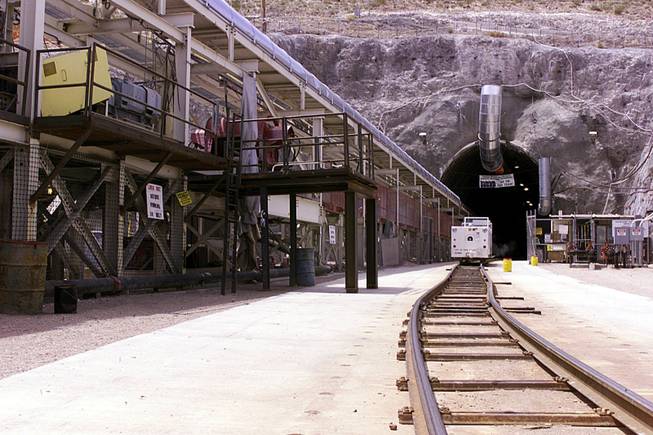
File photo
Yucca Mountain is located about 90 miles northwest of Las Vegas.
Thursday, Jan. 26, 2012 | 2:10 p.m.
Related story
Sun Archives
WASHINGTON — Nuclear waste should be stored in places where there is consent, not opposition, the U.S. energy secretary was told today by a commission that was assigned by the president to review the nation’s approach to storing nuclear fuel.
The commissioners cited the Obama administration’s decision to halt work on a Yucca Mountain repository, and the acrimony that has since ensued, as an example of where the country’s nuclear waste management policy is in a shambles, while stressing that to continue the impasse is unacceptable.
The commission has been meeting for more than two years to lay a way forward for safe, long-term management and disposal of spent nuclear fuel and radioactive waste. The lack of a national strategy has complicated efforts to expand the country’s domestic production of nuclear energy.
The 180-page report is the culmination of its efforts.
In their summary, commissioners wrote: “The need for a new strategy is urgent, not just to address these damages and costs but because this generation has a fundamental, ethical obligation to avoid burdening future generations with the entire task of finding a safe, permanent solution for managing hazardous nuclear materials they had no part in creating.”
In their letter to Energy Secretary Steven Chu, commissioners said their recommendations, which would require action by the White House and Congress, are “what we believe is the best chance of success going forward, based on previous nuclear waste management experience in the U.S. and abroad.”
Among the commissioners’ recommendations is one to create an organization to safely store, transport and dispose of nuclear waste, as well as changing the manner in which the government accounts for the approximately $750 million a year in fees ratepayers are paying into the Nuclear Waste Fund to ensure those dollars are available to use for nuclear storage.
On the books, the money is still slated for construction of Yucca Mountain; in practice, the money is going toward deficit reduction and to pay for other programs. Nuclear-dependent states and nuclear energy companies have sued the government to reclaim the dollars they paid in but for which they’ve received no service in return.
Nevada was first put forward as a site for nuclear waste storage in 1982, and in 1987, Congress voted to make Yucca Mountain the nation’s official repository for nuclear waste.
It was supposed to be up and running by 1998.
While the commissioners urged the country to start developing “at least one geologic disposal facility and at least one consolidated storage facility,” the body did not make any ruling or recommendation on the topic of Yucca Mountain specifically. In fact, the commission was specifically told not to address Yucca Mountain or any other specific site, or give any opinion on what the role of nuclear power in the national energy mix ought to be.
“These are all important questions that will engage policymakers and the public in the years ahead,” the commissioners wrote. “However, none of them alters the urgent need to change and improve our strategy for managing the high-level waste and spent fuel that already exist and will continue to accumulate so long as nuclear reactors operate in this country.”
The political fighting over the fate of Yucca Mountain reached a high pitch last year, as a new House Republican majority sought to restart the stalled Yucca Mountain construction process to enable the expanded development of nuclear waste.
An international disaster at the Fukushima Daiichi power plant in Japan, and a round of infighting at the country’s body tasked to oversee nuclear safety, have thrown House Republicans’ efforts in relief against a parallel conversation about whether the country should be looking toward nuclear power to play a significant role in our energy sector at all.
President Barack Obama and his administration have been mostly supportive of the push to expand the country’s nuclear capacity, but not to the point of pressing for Yucca — that’s been as much a non-starter for the president as it has been for the project’s most zealous detractor, Nevada Sen. Harry Reid.
“The Yucca Mountain project failed and is now a relic of the past. The Blue Ribbon Commission’s final report is a critical step toward safely and securely managing nuclear waste,” Reid said in a statement Thursday praising the commission’s report. “Most importantly, this report makes abundantly clear that no state, tribe or community should be forced to store spent nuclear fuel or high-level waste without its express consent. Yucca was originally selected because of a flawed, nonscientific and political process, and it failed because Nevadans, with good reason, overwhelmingly opposed it.”

Join the Discussion:
Check this out for a full explanation of our conversion to the LiveFyre commenting system and instructions on how to sign up for an account.
Full comments policy